







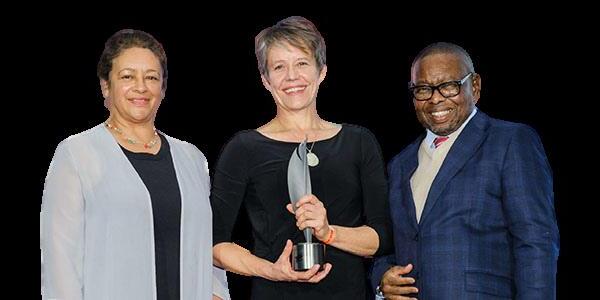


Dear reader,
As we reflect on the past year, we at the Wits Faculty of Health Sciences are filled with immense pride in our collective achievements and the contributions of our dedicated staff, researchers, students, and alumni.
This year has also been another successful year in the growth of research at the Wits FHS, which remains among the top three Health Sciences Faculties on the African continent and the top 250 globally. The notable success of the Researchers in the Faculty is evident from multiple large grants that Researchers have been able to attract, enabling them to lead cutting-edge science that is highly regarded internationally The Faculty can pride itself on the ongoing contribution which the Researchers at Wits make to informing policy in South Africa, in Africa and globally, including in the fields of non-communicable diseases, vaccines, TB and HIV
To this end, our faculty members have been recognised with prestigious research awards and National Research Foundation (NRF) ratings, affirming the calibre of their contributions to science and healthcare Among these accolades, we celebrate the remarkable achievement of four faculty researchers receiving the South African Medical Research Council (SAMRC) Scientific Merit Gold Awards, a testament to their dedication to advancing healthcare
Our researchers continue to publish in high-impact factor journals, contributing knowledge that addresses critical global health challenges Notably, our research output is increasingly geared towards social impact and advancing health burdens unique to Africa. This commitment positions the faculty as a leader in generating knowledge that not only promotes science but also changes lives
The development of the Wits Research Bio-hub, a 28,000-square-meter campus in close proximity to the Health Sciences Campus is expected to be completed before the end of 2025. It will contribute to Wits FHS’ emergence to being even more competitive in growing research and innovation across multiple disciplines.
We are thrilled to have kicked off the year with the official opening of the R100 million expansion of the Wits Roy McAlpine Burns Unit at Chris Hani Baragwanath Academic Hospital. This state-of-the-art facility and the only public specialised burns centre in Gauteng that serves all patients who cannot afford treatment at private facilities. It stands as a beacon of innovation and care, reflecting our mission to bridge gaps in healthcare delivery and make a tangible difference in people’s lives
Our alumni continue to be a source of immense pride as they excel globally Their achievements are a testament to the strength of their education and the opportunities fostered by the faculty
To our researchers, who push boundaries and challenge the status quo; our educators, who shape the minds of the future health workforce; and our students, who inspire us with their drive and potential – we thank you As we celebrate these milestones, we look to 2025 with optimism
Yours truly,

Shabir A Madhi Dean: Faculty of Health Scie

Lancet
Wits researchers involved: Marta C Nunes
The global burden of respiratory syncytial virus (RSV) lower respiratory tract infection (LRTI) in young children is high The RSV prevention strategies approved in 2023 will be essential to lowering the global disease burden In this Series paper describes clinical presentation, burden of disease, hospital management, emerging therapies, and targeted prevention focusing on developments and groundbreaking publications for RSV. The study conducted a systematic search for literature published in the past 15 years and used a non-systematic approach to analyse the results, prioritising important papers and the most recent reviews per subtopic
Annually, 33 million episodes of RSV LRTI occur in children younger than 5 years, resulting in 3·6 million hospitalisations and 118 200 deaths RSV LRTI is a clinical diagnosis but a clinical case definition and universal clinical tool to predict severe disease are non-existent The advent of molecular point-of-care testing allows rapid and accurate confirmation of RSV infection and could reduce antibiotic use There is no evidence-based treatment of RSV, only supportive care.
Despite widespread use, evidence for high-flow nasal cannula (HFNC) therapy is insufficient, and increased paediatric intensive care admissions and intubation indicate the need to remove HFNC *Read full study
Lancet
Wits researcher involved: Matthew Chersich
The Lancet Countdown calls for increased health sector leadership in the climate crisis However, it is silent about holding researchers accountable for their links or perceived links to the fossil fuel industry This industry, like tobacco and pharmaceuticals, has long deployed researchers to deny or distort science. Although editors oblige researchers to declare direct research funding, the question of disclosing more indirect relationships is worth considering
Given expanding options and the profitability of environmentally responsible investments, holding pension funds or university endowments in fossil fuel companies is now an individual or institutional choice. Is choosing to profit from an industry about which one writes a conflict of interest, or something a reader might perceive as such? Within the letter of the law, guidelines from the International Committee of Medical Journal Editors (ICMJE) offer little leniency, stating: “You should disclose all relationships and/or activities/interests...that are related to the content of your manuscript.” In its author disclosure of interest forms, the ICMJE counsels a precautionary approach: “If you are in doubt about whether to list a relationship and/or activity/interest, it is preferable that you do so ” Although pension funds might be opaque, universities that continue to invest in fossil fuels clearly have questions to answer
In the spirit of principled leadership, *Read
Medicine
Wits
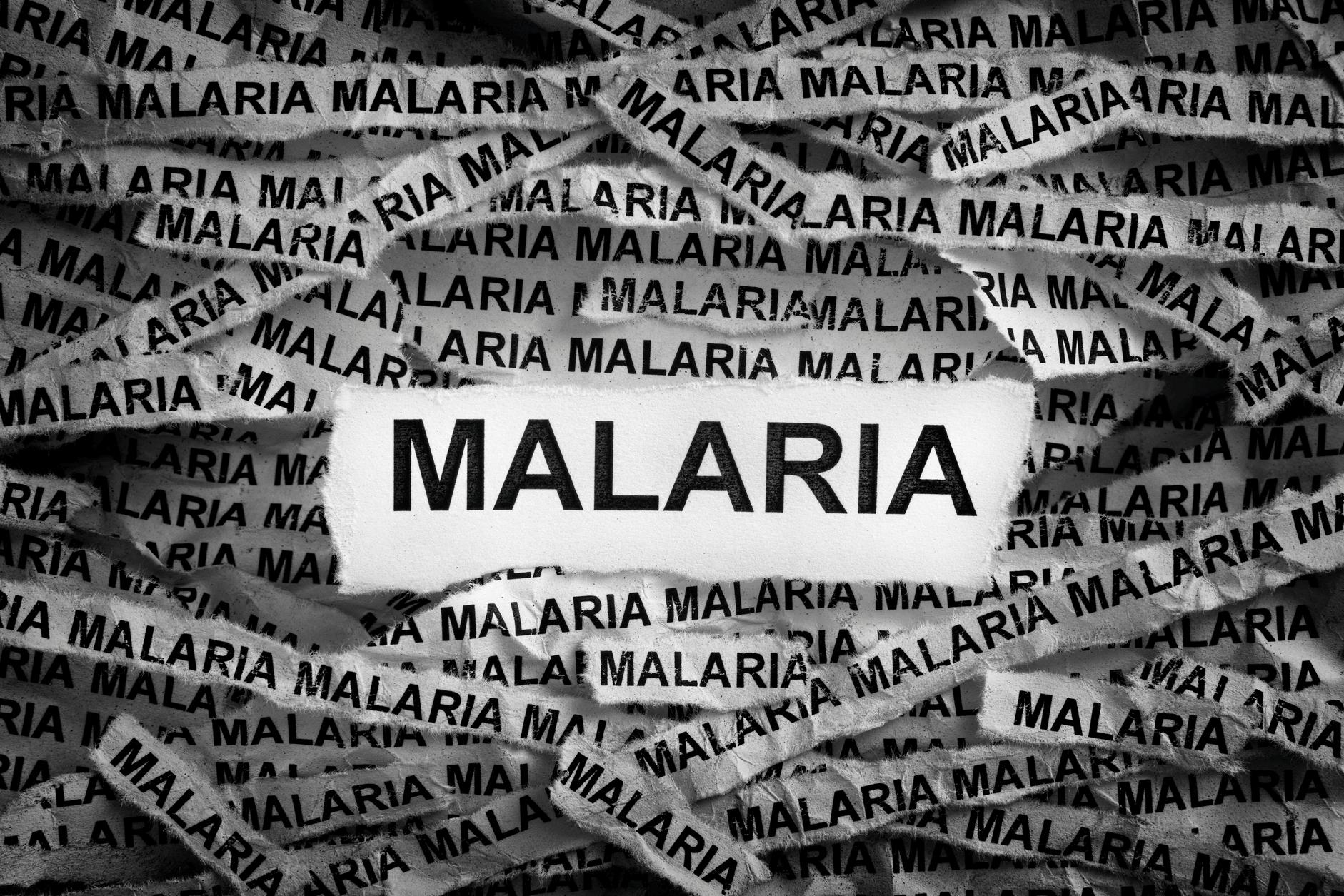
researchers involved: Immo Kleinschmidt
Malaria-elimination interventions aim to extinguish hotspots and prevent transmission to nearby areas
Here, this paper re-analyzed a cluster-randomized trial of reactive, focal interventions (chemoprevention using artemether–lumefantrine and/or indoor residual spraying with pirimiphos-methyl) delivered within 500 m of confirmed malaria index cases in Namibia to measure direct effects (among intervention recipients within 500 m) and spillover effects (among nonintervention recipients within 3 km) on incidence, prevalence and seroprevalence. There was no or weak evidence of direct effects, but the sample size of intervention recipients was small, limiting statistical power.
There was the strongest evidence of spillover effects of combined chemoprevention and indoor residual spraying Among non-recipients within 1 km of index cases, the combined intervention reduced malaria incidence by 43% (95% confidence interval, 20–59%) In analyses among non-recipients within 3 km of interventions, the combined intervention reduced infection prevalence by 79% (6–95%) and seroprevalence, which captures recent infections and has higher statistical power, by 34% (20–45%)
Accounting for spillover effects increased the costeffectiveness of the combined intervention by 42%.
Targeting hotspots with *Read the full study
New England Journal of Medicine
Wits researchers involved: Sinead Delany-Moretlwe
According to the findings of the HIV Prevention Trials Network (HPTN) 083 and 084 trials (ClinicalTrials gov numbers, NCT02720094 and NCT03164564, respectively), long-acting injectable cabotegravir (CAB-LA) was more effective than daily oral tenofovir disoproxil fumarate–emtricitabine at preventing HIV from being transmitted through sexual contact In these trials, weit was found that CAB-LA preexposure prophylaxis (PrEP), which is referred to as "long-acting early viral inhibition (LEVI)," changed the way acute HIV infection manifested.
In this letter, Professor Delany-Moretlwe and colleagues discuss how the high rates of HIV continue to be observed in women, particularly adolescents in eastern and southern Africa. “Even in the context of a generalised HIV epidemic, higher rates of HIV have also been observed in men who have sex with men, sex workers, and trans and gender non-binary individuals” says Delany-Moretlwe.
She says that with the currently available HIV treatment being a “life-long” therapy, long-acting pre-exposure prophylaxis (PrEP) presents the potential to “reduce HIV incidence, particularly in populations that struggle with daily oral pill taking” and thus have significant social and health impact
Although the report describes the altered presentation of acute HIV infection in the context of long-acting PrEP, Professor Delany-Moretlwe says that these unique findings are currently limited to HIV However, these observations may be relevant to other infections where long-acting agents are*Read the editorial letter
Nature Medicine

Wits researchers involved: Jinal N. Bhiman, Stefano Tempia, Jackie Kleynhans, Vimbai Sharon Madzorera, Qiniso Mkhize, Haajira Kaldine, Nicole Wolter, Jocelyn Moyes, Maimuna Carrim, Neil A Martinson, Kathleen Kahn, Limakatso Lebina, Jacques D. du Toit, Anne von Gottberg, Penny L. Moore, Cheryl Cohen (PHIRST-C group)
Serum-neutralizing antibodies (nAbs) induced by vaccination have been linked to protection against symptomatic and severe coronavirus disease 2019. However, much less is known about the efficacy of nAbs in preventing the acquisition of infection, especially in the context of natural immunity and against severe acute respiratory syndrome coronavirus 2 (SARS-CoV-2) immune-escape variants
Here, the study conducted a mediation analysis to assess serum nAbs induced by prior SARS-CoV-2 infections as potential correlates of protection against Delta and Omicron infections in rural and urban household cohorts in South Africa The findings are that, in the Delta wave, D614G nAbs mediate 37% (95% confidence interval: 34–40%) of the total protection against infection conferred by prior exposure to SARS-CoV-2, and that protection decreases with waning immunity. In contrast, Omicron BA.1 nAbs mediate 11% (95% confidence interval: 9–12%) of the total protection against Omicron BA 1 or BA.2 infections due to Omicron’s neutralization escape These findings underscore that correlates of
protection mediated through nAbs are variant-specific and that boosting nAbs against circulating variants might restore or confer immune protection lost due to nAb waning and/or immune escape However, the majority of immune protection against SARS-CoV-2 conferred by natural infection cannot be fully explained by serum nAbs alone Measuring these and other immune markers, including T cell responses, both in the serum and in other compartments such as the nasal mucosa, may be required to comprehensively understand and predict immune protection against SARS-CoV-2
This paper found that periodic booster recommendations with updated formulations matching circulating strains may be necessary. “Our study also indicates that neutralizing antibodies are only one part of the puzzle for a comprehensive understanding of protective immunity against SARS-CoV-2, as the majority of protection cannot be explained by serum neutralizing titers alone, at least for infection-induced immunity,” says Professor Cheryl Cohen, the corresponding author of the paper and member of the PHIRST-C Group
She also cites that the limitation of the study is the inability to measure other potential protective immune markers, such as B-cell and T-cell responses in serum and other compartments like the nasal mucosa, as well as mucosal IgA/IgG levels.
*Read the full study
Nature Medicine
Wits researchers involved: G Justus Hofmeyr

Timely detection and treatment of postpartum hemorrhage (PPH) are crucial to prevent complications or death. A calibrated blood-collection drape can help provide objective, accurate and early diagnosis of PPH, and a treatment bundle can address delays or inconsistencies in the use of effective interventions The study conducted an economic evaluation alongside the E-MOTIVE trial, an international, parallel cluster-randomized trial with a baseline control phase involving 210,132 women undergoing vaginal delivery across 78 secondary-level hospitals in Kenya, Nigeria, South Africa and Tanzania
The study aimed to assess the cost-effectiveness of the E-MOTIVE intervention, which included a calibrated blood-collection drape for early detection of PPH and a bundle of first-response treatments (uterine massage, oxytocic drugs, tranexamic acid, intravenous fluids, examination and escalation), compared with usual care.
A multilevel modeling to estimate incremental costeffectiveness ratios from the perspective of the public healthcare system for outcomes of cost per severe PPH (blood loss ≥1,000 ml) avoided was used and cost per disability-adjusted life-year averted The study findings suggest that the use of a calibrated blood-collection drape for early detection of PPH and bundled firstresponse treatment is cost-effective and should be perceived by decision-makers as a worthwhile use of healthcare budgets.
He further adds that “the social impact is considerable because of mothers' key contributions to childhood development and society in general The economic costs of measuring blood loss after birth may be modified by using a locally produced disposable drape (Sinapi biomedical) or the reusable Maternawell tray (Maternova).”
Read full study
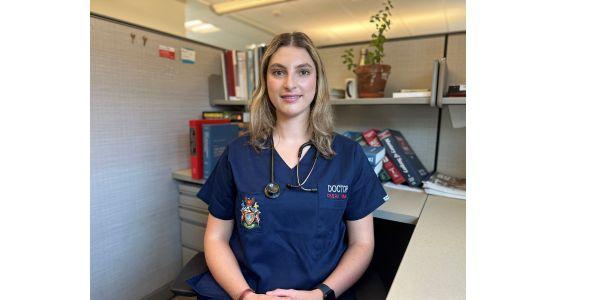
Dr Gabriella Hyman awarded the prestigious Dr Esther Mahlangu Doctoral Fellowship for her clinicianscientist role and research in SA public health sector.
The South African Women in Science Awards (SAWiSA) recognise women scientists and researchers who are role models for younger women and who encourage early career researchers and scientists to continue in science, technology, engineering, and maths (STEM)-related careers
Dr Gabriella Hyman, a Lecturer in Surgery in the School of Clinical Medicine in the Faculty of Health Sciences, was awarded for her emerging work on health systems research for surgical care delivery in the South African public hospital sector
Hyman says that strengthening surgical health systems ensures that the broader health system can deliver excellent surgical care
“We use innovative tools and methodologies to improve the service delivery platform, financing mechanisms, and policies needed to deliver safe, timely and affordable surgical care to all South Africans," she says.
The key components of surgical care delivery include human resources (training surgical care providers); infrastructure (upgrading facilities, equipment, and supply chains); service delivery (optimising workflows); financing (ensuring sustainable funding for surgical services); and governance (developing policies and standards for safe and effective surgical care)
Hyman says, “We want to understand what is going on in surgical care delivery Investing in health information systems to monitor provision and outcomes - such as morbidity and mortality - is important So is developing more robust clinical governance. Through our work, we have developed instruments and methodologies that can be used from the frontline provider, to the facility manager, to the policy-maker level "
Combining research with on-the-ground and efficient patient care is the ultimate goal of medical science in under-resourced settings.
Clinician-scientists are particularly important in the South African public healthcare sector as they can design and implement research that is directly relevant to local health needs. This includes understanding the barriers to care, developing context-specific interventions, and advocating for policy changes that promote health equity *Read more

Wits RHI is delighted to share these groundbreaking results from the US pharmaceutical company Gilead’s Phase 3 Purpose 1 trial which indicated that the company’s twiceyearly injectable HIV-1 capsid inhibitor, lenacapavir, demonstrated 100% efficacy for the investigational use of HIV prevention in cisgender women.
This marks a significant step forward in HIV prevention.
Wits RHI’s Professor Thesla Palanee-Phillips, a lead researcher on the trial who co- managed the Wits RHI Research Centre Clinical Research site in Hillbrow Johannesburg in South Africa where 212 number young women were enrolled, said “ This is a pivotal moment in HIV prevention and we stand proud and with gratitude
alongside the women in South Africa and Uganda who contributed to this outcome Our study team is both thrilled and humbled to have contributed to this Phase 3 trial that is the first HIV prevention trial ever in history to show zero HIV infections with an intervention. We look forward to next steps and expanding HIV prevention choice for women in Africa and the world”
Co-Principal Investigator and clinician on the trial alongside Prof Palanee-Phillips, Dr Nkosiphile Ndlovu shares her sentiments “This is an exciting time to be alive These exceptional results will help us expand HIV prevention options for African women. For once, we are in the forefront of groundbreaking research as Africans.”
*Read more
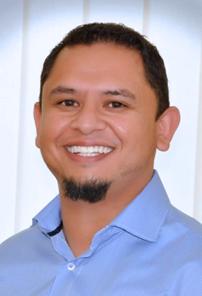
Professor Yahya Choonara has been awarded a Tier 1 South African National Research Foundation (NRF) / Department of Science and Innovation (DSI) SARChI Research Chair in ‘Prototyping 21st Century Therapeutics in Advanced Drug Delivery, Nanomedicine and Regenerative Medicine”.
The Chair is based in the Department of Pharmacy and Pharmacology at the University of Witwatersrand As a pharmaceutical scientist who co-founded the Wits Advanced Drug Delivery Platform (WADDP) research unit, his research focuses on enhancing the therapeutic efficacy and minimizing the harmful side-effects of drugs (or other bioactives), enables the introduction of new classes of therapeutics, and repurposes suboptimal drugs that may be considered undevelopable into patient-centric therapeutics.
Professor Choonara says this Chair will further expand his work in the pharmaceutical sciences in South Africa, on the continent, and internationally to build deeper partnerships with other renowned institutions and research groups working in this domain His aim is for the SARChI Chair program to continue leading
the pharmaceutical sciences research agenda for Low and Middle-Income Countries (LMICs)
Resolving the gaps in access to quality medicines remains a massive injustice in the context of LMICs –highlighted by the World Health Organisation’s (WHO) statement on medicines access for LMICs – to promote access to basic and advanced medication. Choonara says that developing local expertise in pharmaceutical sciences to enhance research, development, and production is a way to ensure better access to innovative medicines for diseases that disproportionally affect LMICs.
For example, medicines in three therapeutic areas, i.e., Neurotherapeutics, Infectious Diseases, and Oncology, have several unmet therapeutic needs for patients in LMICs. Choonara says that creating an ecosystem of innovation, entrepreneurship, and technology transfer in the pharmaceutical sector will help build our local product development capacity, eventually limiting reliance on importing innovative medicines and encouraging local pharmaceutical manufacturing of specialized medicines *Read more


The largest systematic review of its kind assesses 198 studies across 66 countries on the impact of heat on maternal, foetal, and neonatal health.
This landmark study comes as world leaders prepare for COP29 It provides open-access insights that highlight the urgent need for health-focused climate policies
The study, Systematic review and meta-analysis of heat exposure impacts on maternal, foetal, and neonatal health, was published in Nature Medicine on 5 November
Researchers at the Planetary Health Research Division in the Faculty of Health Sciences at Wits University were amongst the authors, including the lead author.
Heat exposure increases odds of preterm birth
With year-on-year record breaking global temperatures, the health risks for vulnerable populations especially pregnant women and newborns are increasingly concerning
The review found that for every 1°C increase in heat exposure, there was a 4% increase in odds of preterm birth across all the studies. During a heatwave, the odds of preterm birth increased by 26%
Similarly, the review found marked increases in other adverse outcomes such as increased risk for gestational diabetes, stillbirths, congenital anomalies and *Read more
Most mental health problems begin in adolescence. In South Africa, current estimates suggest that about 20 to 30 percent of adolescents have depressive symptoms Depression interferes with education, employment and relationships, and can hinder young people's ability to reach their full potential. It is also a significant risk factor for suicide While effective psychological treatments to address depression exist, the reality is that most young people do not have access to them. The Digital delivery of Behavioural Activation to overcome depression and facilitate social and economic transitions amongst adolescents (DoBAt) Study sought to address this gap.
Access to care for people with depression in low- and middle-income countries (LMICs) is hampered by insufficient public expenditure on mental health and a gross shortage of mental health professionals. Stigma and low levels of mental health awareness also inhibit people from seeking care. Digital delivery of psychological treatments holds the potential to overcome these barriers and is increasingly relevant for adolescents in LMICs, given the global trajectory of smartphone ownership and internet access
The DoBAt Study, based at the MRC/Wits Rural Public Health and Health Transitions Unit (MRC/WitsAgincourt), aimed to develop and evaluate a digital psychological treatment to address *Read more

The Perinatal HIV Research Unit (PHRU) officially opened its new DataLab This move was made in response to the Unit’s need to consolidate its expanding data management capabilities, particularly as its various research applications began to flourish.
The idea, which emerged in 2022, was simple yet profound: to bring together a team of data professionals in a single, dedicated space to foster creativity, collaboration, and efficiency. By early 2024, this vision became a reality with the establishment of the PHRU DataLab, which has since contributed to numerous projects ranging from routine data collection to groundbreaking data initiatives
In addition to the data support services already in place at PHRU, the lab expands its focus on creating innovative data collection tools and strategies, with a strong emphasis on AI-oriented approaches The DataLab is already making significant strides, implementing two multi-site studies within South Africa and a project that spans eight African countries. These advancements build on optimized and scaled-up solutions, such as a REDCap-powered call centre Other innovative solutions include using Quadratic Voting to determine participant preferences, employing Machine Learning to read Urinary LAM results, collecting sky images to predict air quality, and developing a vehicle parking tool for PHRU operations.
According to Floris Swanepoel, *Read more
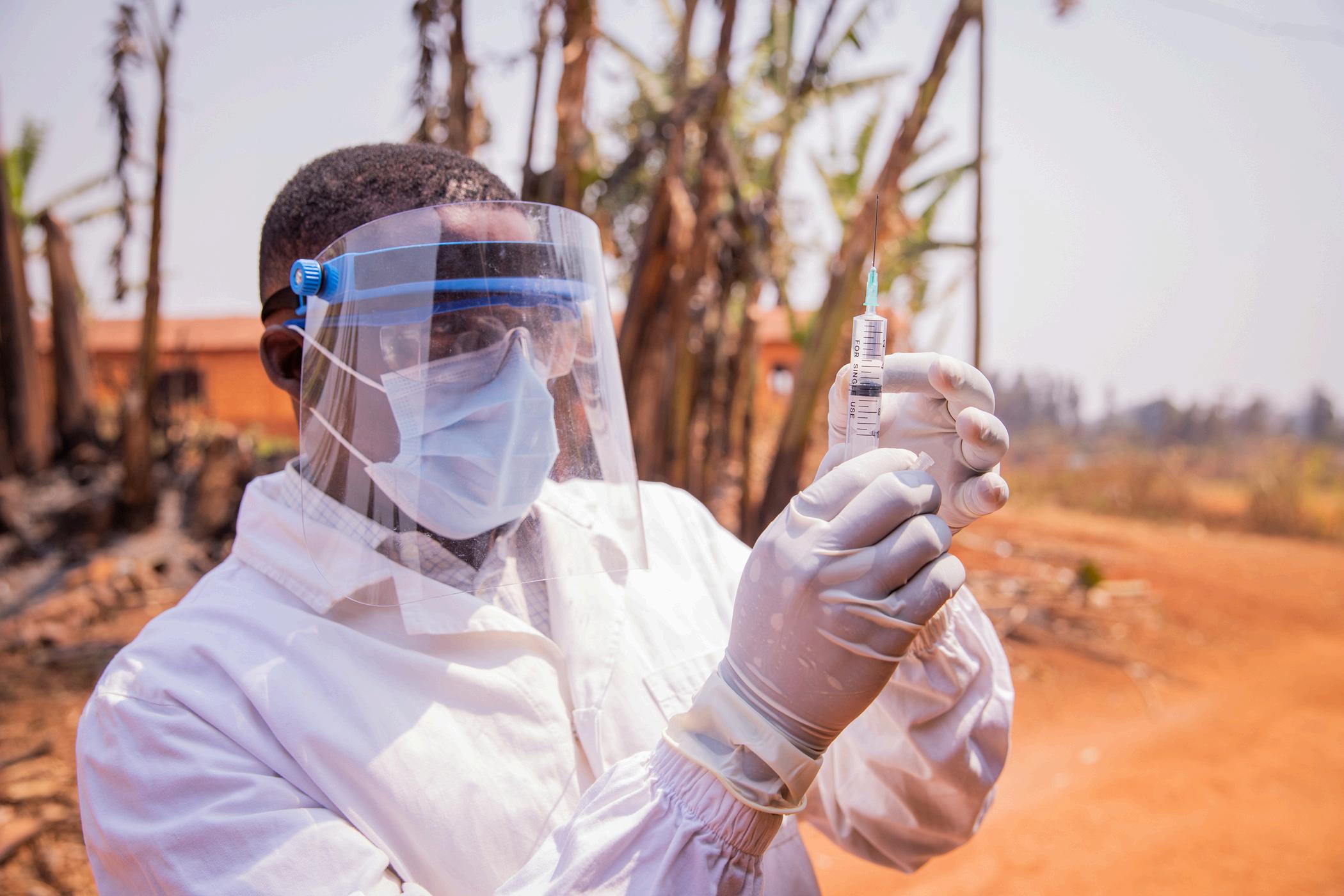
As the need for improved drug-resistant TB therapy options increases globally, South Africa is faced with the urgency of the development of such treatments as TB is the second most common cause of death in the country
This gave rise to the first-ever clinical study for a drugresistant tuberculosis (TB) treatment regimen, offering hope to millions affected worldwide Known as the BEAT TB Study, this research is a collaboration between the Clinical HIV Research Unit – a division of the Wits Health Consortium and the National Department of Health. Funded by the United States Agency for International Development (USAID), the BEAT Tuberculosis clinical trial was carried out at the Clinical HIV Research Unit (CHRU) Isango Lethemba TB Research Unit in the Eastern Cape and KwaZulu-Natal over the previous six years.
The study has revealed a revolutionary regimen that could dramatically change TB treatment worldwide It achieved an impressive cure rate of 85–90% for patients with drug-resistant TB, significantly improving from the 50% cure rate seen with previous regimens. This new regimen is particularly remarkable as it safely and effectively includes two vulnerable groups often left out of TB treatment research: pregnant women and children Historically, these groups faced *Read more

Featured Wits researcher: Catherine Draper
The importance of the first 1000 days of a child’s life ais well document. A new study reveals that the ‘next’ 1000 days of a child’s life, after the age of 2, is critical for later development.
A new Lancet journal series, Early Childhood Development and the Next 1000 Days, reveals that the period between the ages of 2 and 5 can build on investments and gains in child growth and development, particularly if opportunities are missed in the first 1000 days.
Every year of early childhood care and education for all children costs less than 0.15% of low and middleincome countries' (LMICs) gross domestic product The potential benefits of providing these programmes are, on average, 8-19 times larger than the cost of implementing them In LMICs, 181 9 million children almost three-quarters of all children aged three or four do not have access to adequate nurturing care, putting their healthy development at risk. Nurturing care is defined as the overall health, nutrition, security, and safety of every child, as well as responsive
caregiving and learning at an early age
Leader of the series, Dr Catherine Draper, who is based at the Developmental Pathways for Health Research Unit, University of the Witwatersrand, said that the prestigious Lancet series has “brought together global researchers who share a passion for early childhood development and were keen to profile the ‘next 1000 days’ as a crucial stage of development, especially in LMICs Children from LMICs not only need to feature more strongly in research on the next 1000 days but should also be receiving the care they need to thrive. This includes supporting caregivers of young children and ensuring they have access to high-quality early care and education programmes ”
Investing in the next 1000 days of life can help improve development and growth, strengthen protective factors, and reduce environmental risks. This suggests that child-centred development policies, strategies, and programmes must continue recognising and enhancing the crucial roles of care, education, and protection systems These can recalibrate a child’s potential for the next 1000 days of life. *Read more
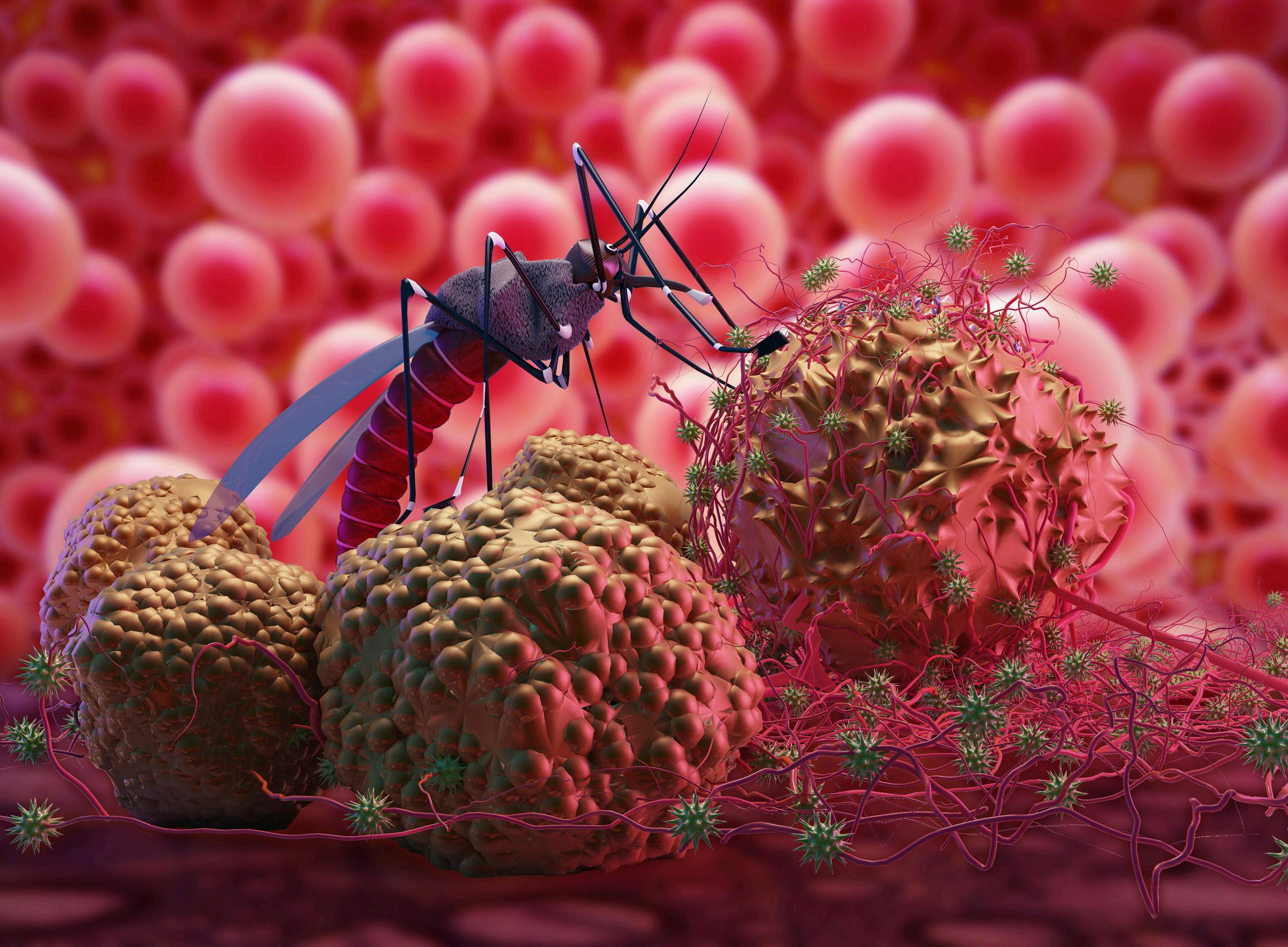
Wits authors: Chia-Yu Chen, Shüné Oliver
The months of September to May are an unfortunate season in South Africa: malaria season The mosquitoborne disease is found in the north-eastern districts of KwaZulu-Natal, Mpumalanga and Limpopo provinces.
There are fewer malaria cases in South Africa compared to other African countries The World Health Organization estimated there were over 10 million cases of malaria in Mozambique in 2022. South Africa, that country’s neighbour, recorded 5,183 malaria cases between September 2022 and August 2023
Its relatively low case numbers may be a result of South African health authorities’ excellent work in controlling the disease (control efforts began more than 120 years ago). The last major malaria outbreak in South Africa was in 2000, when more than 60,000 cases were recorded. Also notable was the 2017 outbreak, with 28,264 cases
Scientists are using and developing many different “weapons” in the fight against malaria. Our approach involves using mosquitoes’ own gut bacteria to prevent them from spreading malaria This is a form of of biocontrol, which involves the use of living organisms
or natural substances to control harmful pests.
The groundwork we’re laying with this ongoing research will, we believe, allow us and other scientists to create a powerful malaria-beating tool
There is a continuing problem of mosquitoes developing resistance to the insecticides that are used to spray the walls inside houses New insecticides are not being produced fast enough to keep up with the demand.
The gut bacteria of mosquitoes are an integral part of their immune system because they can help the insects fight off infections, including malaria. The parasite that causes malaria infects the mosquito when an adult female mosquito takes an infected blood meal from a human. Malaria parasites are likely bad for the insect, so they try to fight the infection Most mosquitoes are quite good at fighting off the infection.
Read the full original article This article is republished from The Conversation under a Creative Commons license
Wits authors: Raquel AB Duarte, Caroline Dickens, Therese Dix-Peek
There are many myths about breast cancer, particularly in Africa with its rich diversity of people, different genetic backgrounds and ancestral histories

An advertising campaign from the US, for example, asserts that 1 in every 8 women will develop breast cancer during their lifetime.
This statistic has pervaded the rest of the world, where it is accepted as fact But in sub-Saharan Africa, the lifetime risk of a woman developing breast cancer is much lower. In South Africa, for example, the lifetime risk of a black woman developing breast cancer is 1 in 43
Breast cancer is still one of the most prevalent cancers in this region, however, and is associated with high mortality because of socio-economic factors that prevent early diagnosis and access to treatment
Myth: Breast cancer is a single disease
In reality, breast cancer has many different forms, based on the expression of proteins on the surface of the tumour cell called receptors
Knowing what type of breast cancer you have is important to determine the treatment you can receive, how likely you are to overcome the cancer, and how
likely it is to recur.
Myth: Cancer in one part of Africa is the same as another
It is commonly believed that African women who develop breast cancer have highly aggressive cancers, such as triple negative breast cancer.
Because of the diversity at both a regional and an individual level, there are differences in the distribution of the different types of breast cancer A review of 63 studies from 24 different African countries found that triple negative breast cancers were most likely to be found in patients from west Africa
Women from east and southern Africa were more likely to have hormone receptor-positive breast cancers. Our research, along with other studies, has shown that in South Africa, women of African ancestry are more likely to have hormone receptor-positive tumours, with or without HER2, types with a better prognosis In a study of over 1,000 breast cancer patients (black women) in Johannesburg, 55% had hormone receptor-positive cancers, 27% had HER2 disease and 14% were triple negative breast cancers
Read the full original article
This article is republished from The Conversation under a Creative Commons license


Professor Penny Moore
Named among the Cell Press’s 50 notable scientists “who inspire”
Professor
Peter Kamerman
IASP Award for Excellence in Pain Research and Management in Developing Countries
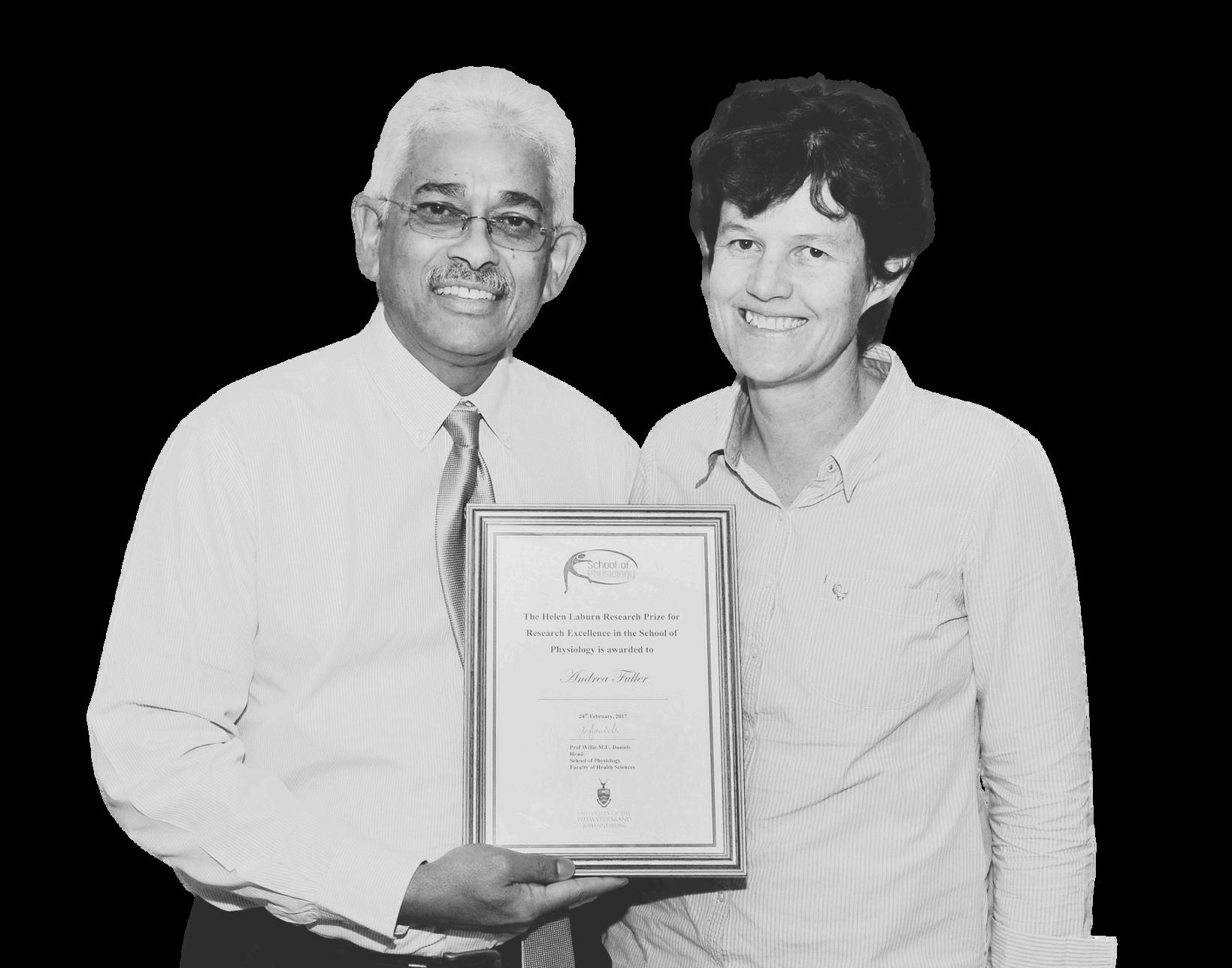
Professor Andrea Fuller
Appointed as Editor-inchief of the journal Conservation Physiology

Distinguished Research Professor Collen Masimirembwa in the Sydney Brenner Institute for Molecular Bioscience to receive award for research in pharmacogenomics.
Pharmacogenomics (also known as pharmacogenetics) is the study of how our genes affect the way we respond to medications. Professor Collen Masimirembwa will receive the Precision Medicine World Conference (PMWC) Pioneer Award at the 2025
conference in California.
The PMWC Pioneer Award recognises Masimirembwa's contributions to pharmacogenomics, in understanding genetic factors affecting drug response in diverse populations.Masimirembwa is a pioneer and champion of pharmacogenomics research in Africa, according to the PMWC He research is focused on drug metabolism and pharmacokinetics [the study of processes such as absorption, distribution, metabolism, and excretion of a drug]. He worked at AstraZeneca in Sweden before founding the African Institute of Biomedical Science and Technology, in Zimbabwe
His achievements include establishing the African Pharmaco-genomics Research Network, under which he is conducting the first multinational study on the implementation of pharmacogenomics-guided treatment in Africa
His work, which includes over 130 peer-reviewed papers, focuses on understanding *Read more
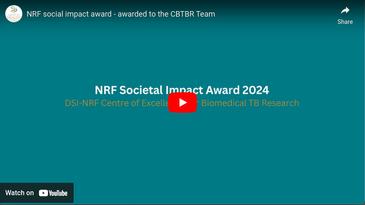
“It's incredible. We have this little lab in Braamfontein on the top of Constitution Hill, but the work done there impacts the whole world. We create meaning and impact,” says Professor Bavesh Kana, the Director and lead investigator of the Wits node of the DSI-NRF Centre of Excellence for Biomedical TB Research (CBTBR)
Professor Kana and his team received the prestigious 2024 National Research Foundation (NRF) SocietalImpactAward to honour their outstanding research that has boosted people's standard of living This award recognises CBTBR’s work on creating quality diagnostic assurance systems for infectious diseases.
This work is centred around addressing specimen mixups and cross-contamination, which are the risks associated with pathological diagnostics These can only be prevented by vigorous specimen collection and handling The CBTBR team develops controls that ensure that such mix-ups (which can lead to test results being given to the wrong patient) do not occur. However, these systems should also account for secure interventions to limit the transmissibility of highly contagious airborne infectious diseases like tuberculosis (TB) Kana says that this entails continuously testing known bacteria and passing them through the laboratory flow to check that their results are indeed what they are expected to be.
Professor Shabir Madhi was officially conferred as an honorary Commander of the Most Excellent
The Dean of Health Sciences and Wits Professor of Vaccinology Shabir Madhi was officially bestowed the CBE medal by UK High Commissioner to South Africa Antony Phillipson on behalf of King Charles III. Madhi received this recognition in 2023 for his exemplary contribution to science and public health during a global pandemic in 2020/2021, which culminated in an awards ceremony.
Madhi is also a member of the Academy of Science of South Africa (ASSAf), the Royal Society of South Africa (RSSAf) and The World Academy of Sciences (TWAS) UK High Commissioner Phillipson said, “I congratulate Professor Shabir Madhi on his honorary award Professor Madhi’s ground-breaking work leading the Oxford/AstraZeneca Covid-19 vaccine clinical trials in South Africa was another accomplishment in a long career dedicated to public health here and around the world ”
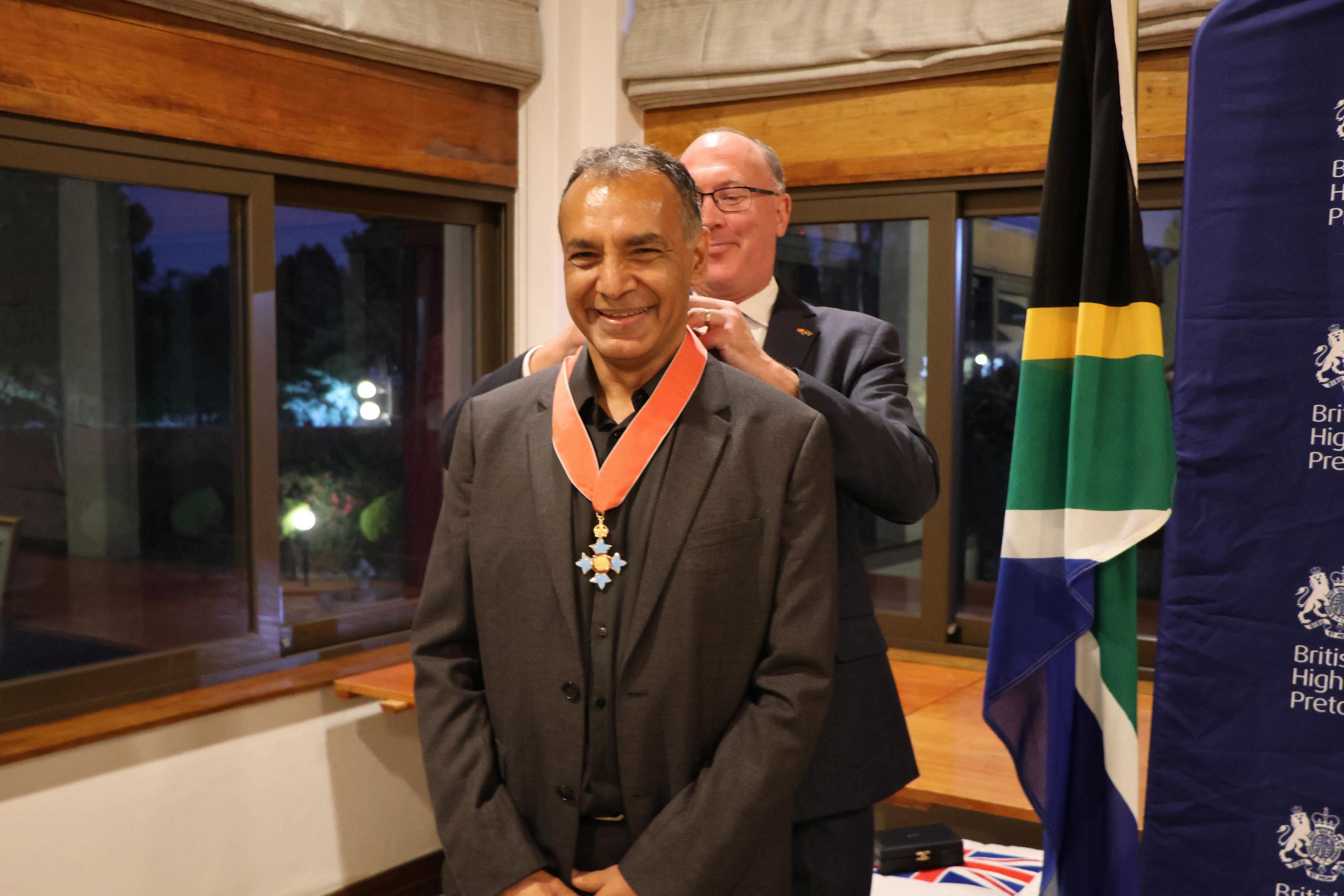
Professor Lynn Morris, deputy vice-chancellor for research and innovation says, “Wits University is extremely proud of Professor Madhi who has consistently been a dedicated and exemplary scientist for both academia and global public health The CBE Award is proof that Professor Madhi is one of the top minds in vaccinology and science in the world It is also just one of the many prestigious awards he has won. It is a truly proud moment.”
Before the advancements of molecular diagnostics, South Africa used bacterial culturing *Read more
Meanwhile, Madhi led South Africa and the continent’s *Read more

Rheumatologists and Wits Professors Patrick Dessein and Miguel González-Gay are in the top 0 05% of global researchers in their field. This prestigious recognition by ScholarGPS highlights Dessein’s and González-Gay's notable lifetime contributions to rheumatology research

risk and cardiovascular diseases in patients with rheumatoid diseases as well as renal diseases,” says Professor Angela Woodiwiss, the Director of CPGRU.
Both professors are practicing Rheumatologists and Honorary Research Professors in the Cardiovascular Pathophysiology and Genomics Research Unit (CPGRU), Wits School of Physiology Their career paths follow a unique arrangement as clinical practitioners seldom partake in active academia, and vice versa – an approach that translates research outputs directly into enhancing patient care.
The pair, who have also collaborated, have significantly advanced the knowledge of cardiovascular risk and cardiovascular disorders in patients with renal and rheumatic diseases on a global scale. “Both Profs Dessein and González-Gay humbly go about their research and yet make substantial international contributions to the understanding of cardiovascular
Prof.
The Vice-Chancellor’s Research Award is the highest accolade for achievement in research at Wits The purpose of the award is to acknowledge the achievements of an exceptional Wits scholar who has demonstrated high levels of research excellence over a sustained period.
ScholarGPS’s rankings are determined by the number of publications that researchers have published, the impact of their work which is measured by citations per published research paper, and the quality of their scholarly output (h-index)
Ranked for rheumatoid arthritis (RA), arthritis and cardiovascular disease, Professor Dessein says that being a practitioner allows him to collect extensive clinical data and conduct comparative studies which he would not be able to do if he were solely in academia He says that it is through such studies that he has been able to contribute to research and data on these conditions, particularly in Southern Africa. "89% of what is recommended [on these diseases] comes from Europe or North America and we blindly apply it. But it doesn’t work for us,” he explains
*Read more
Koekemoer has dedicated 27 years to the understudied African malaria vector She has established several new groundbreaking research fields for South Africa, including the sterile insect technique project, and coraised funds to build the first mass-rearing facility in the country and the continent In 2022, there were 249 million malaria cases globally that led to 608,000 deaths in total. Of these deaths, 76% were children under five-years
*Read more

Associate Professor Palesa Motshabi Professor Chrysis Sofianos

Reappointed Academic Head of Division: Anaesthesiology 01 June 2024

Adjunct Professor Richard Cooke
Reappointed Head of Department Family Medicine 01 June 2024

Dr. Itumeleng
C. Taunyane
Appointed Academic Head of Division Cardiothoracic Surgery 01 October 2024
Academic Head of Division: Plastic & Restorative Surgery 01 June 2024

Reappointed Head of Department Physiotherapy 01 July 2024 Professor Veronica Ntsiea

Dr Tim De Maayer
Academic Head of Division: Paediatrics Gastroenterology 01 June 2024

Reappointed Director of the Steve Biko Centre for Bioethics 01 August 2024 Professor Kevin Behrens

Mantoa
Reappointed Director of the Unit of Undergraduate Medical Education 01 June 2024

Dr Nazeer Ahmed Mohamed pp Head of School 01 September 2024
Appointed Academic Head of Division Endocrinology 01 August 2024

Emeritus Professor Aldo Serafini acknowledged for years of excellence.
Dr Aldo Serafini (MBBCh 1966) has been awarded the Albert Nelson Marquis Lifetime Achievement Award on 29 April 2024
The award was presented by the Marquis Who’s Who, a publisher of biographical profiles since 1898 The acknowledgment recognises individuals “who have achieved greatness in their industry These individuals have excelled in their field for at least 20 years.”
Dr Serafini is described as an “accomplished listee”, with many years of experience in his professional network, and has been noted for achievements, leadership qualities, and the credentials and successes he has accrued in his field Individuals profiled are selected based on reference value, while factors such as position, noteworthy accomplishments, visibility, and prominence in a field are all considered during the selection process.*Read more

Dr Stavros Nicolaou BPharm 1986, DSc Med 2019 honoris causa
Awarded the 2024 Industrial Pharmacy Section Medal in recognition of his leadership and the significant contributi h h d t h lth l three d
Professor Salome Maswime MMed 2014, PhD 2017

Elected to lead the World Health Organization’s (WHO) Collaborating Centre for Integrated Clinical Care, which will be based at UCT where she Heads the Division of Global Surgery in the Faculty of Health Sciences
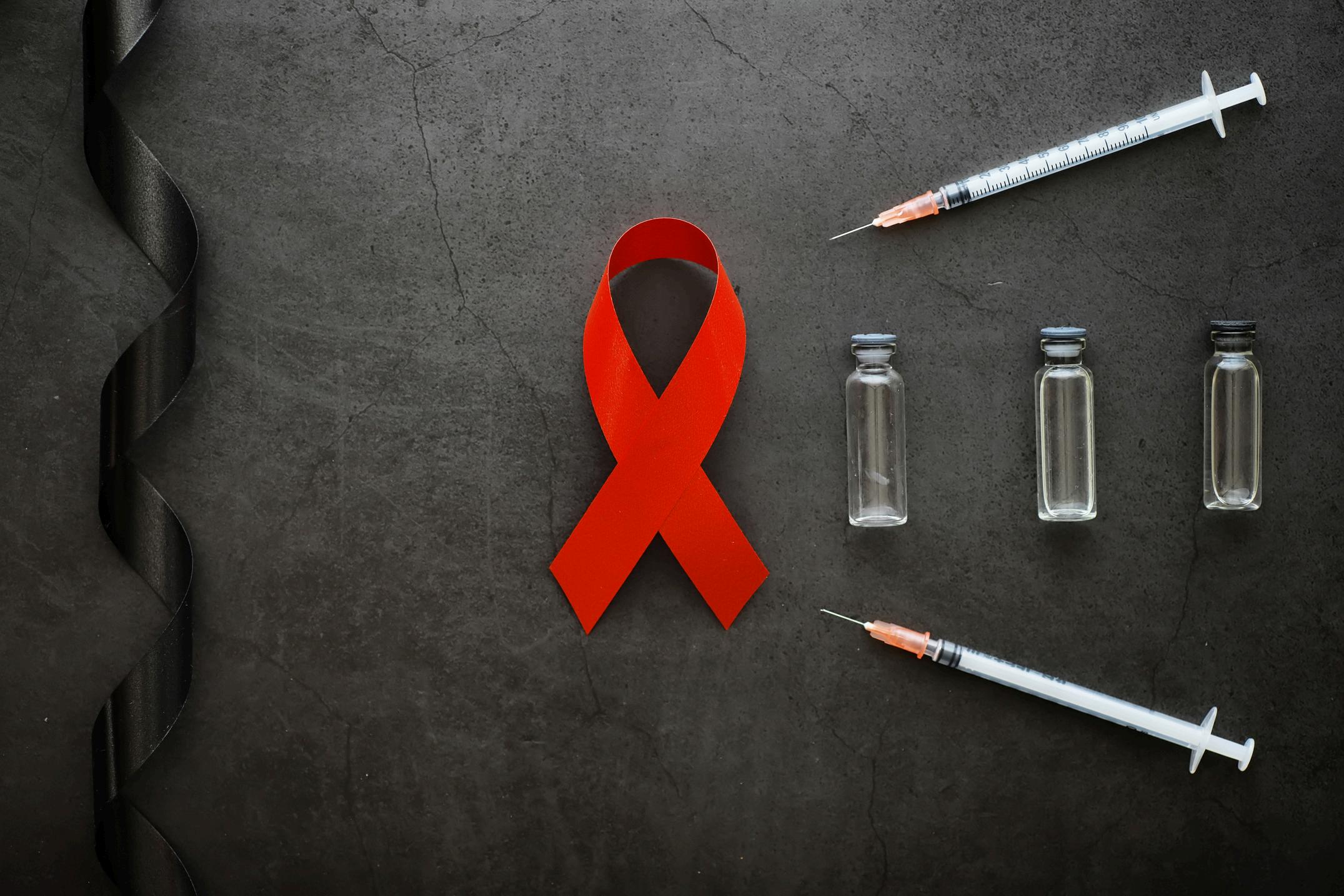
Unitaid is announcing a US$22 million fund to expedite its launch and accessibility Lenacapavir is a groundbreaking long-acting HIV prevention therapy that effectively protected against HIV with two subcutaneous injections per year
Lenacapavir is a ground-breaking long-acting HIV prevention therapy, and Unitaid is announcing a US$22 million fund to expedite its launch and accessibility Lenacapavir is effectively protected against HIV with two subcutaneous injections per year. To ensure that this game-changing breakthrough reaches the most vulnerable communities, Unitaid's US$22 million investment reinforces the great strives to increase the availability and accessibility of long-acting preexposure prophylaxis (PrEP) drugs, which are used to prevent HIV infection
This investment will be centered on leading initiatives in South Africa and Brazil, headed by Wits RHI
and Fiotec, to include lenacapavir into an extensive range of PrEP offerings This program will cater for adolescent girls and young women, men who have sex with men, transgender and non-binary people, and other at-risk groups As the product undergoes authorisation for usage, Unitaid intends to further facilitate quick and widespread adoption
In addition to South Africa and Brazil, this funding will help other pivotal countries prepare their health systems to roll out this life-changing therapy. The accessibility of inexpensive and safe-to-use variants of long-acting PrEP products is further exacerbated by partnership with Wits RHI and the Clinton Health Access Initiative (CHAI), as well as by maintained support of the World Health Organisation's Global HIV and prequalification programs, Medicines Patent Pool, and other intellectual property initiatives.
Professor Nelesh Govender awarded a £2 million grant to research reducing AIDS-related deaths caused by bacterial and fungal infections

mental health and multi-morbidities
I look forward to seeing how their research progresses and the difference their research will make to communities across the world ”
Professor Nelesh Govender’s research topic is Refining Interventions to Reduce AIDS Mortality from Bacterial and Fungal Infections in Africa.
Professor Nelesh Govender was awarded one of 7 prestigious 5-year UK National Institute for Health and Care Research (NIHR) Global Research Professorships
A medical microbiologist/epidemiologist in the School of Pathology, Govender’s proposed research on bacterial and fungal infections in people with advanced HIV disease (or AIDS) will now, with this NIHR funding, be applied to assess a World Health Organization package of care.
Specifically, this package of care for people living with AIDS could be refined or expanded to prevent deaths from bacterial or fungal infections
NIHR Director of the Global Health Research Programme, Professor Kara Hanson, says: “The Global Research Professorship is our flagship award It funds researchers to translate discoveries into enhanced interventions, diagnoses and treatments. This year, our Global Research Professors are working across a range of pertinent areas including sexual health, HIV/AIDS,
According to Govender, at least one-third of the 630,000 global AIDS-related deaths are due to bacterial and fungal infections, which include cryptococcal meningitis, Pneumocystis jirovecii pneumonia (PCP), pneumococcal and Salmonella infections and histoplasmosis.
“From autopsy studies, we know that people with AIDS often die with multiple co-infections,” he says. Meanwhile, some AIDS-related infections are unique to southern Africa. “We first described a fungus –Emergomyces africanus – causing a life-threatening infection in people with AIDS in 2013. Histoplasmosis, although found worldwide, is underdiagnosed in Africa because there is no access to simple accurate diagnostic tests.”
Histoplasmosis can be also mistaken for tuberculosis (TB). Opportunistic infections, such as PCP, pneumococcal and non-typhoidal Salmonella infections, occur everywhere in the world but are much more common in low-to-middle-income countries with a high prevalence of AIDS.*Read more
Drs Jinal Bhiman (WITS and NICD) and Jackie Weyer (UP and NICD) have been awarded a grant of USD 200,000 by the Bill and Melinda Gates Foundation Grand Challenges award to establish an immunodiagnostics pipeline for infectious diseases in Africa. The will run from September 2024 – March 2026
This study, will be completed together with Dr Tshele Mokhantso, Dr Dale Kitchin, Dr Nazneen Moola and Professor Penny Moore.
This study is warranted as the emergence and distribution of viral pathogens continue to be exacerbated by climate change, natural habitat destruction and increased human mobility. Although molecular based detection methods are more widely used in Africa, their cost and limited accessibility and availability remains a challenge Thus, the need for rapid and accurate diagnostic reagents for outbreak
characterisation and surveillance of emerging and regionally important viral pathogens remains Antibody-based immunoassays, including ELISAs and rapid lateral flow tests, provide complementary tools to assess pathogen epidemiology
The study will adapt a high-throughput antibody isolation pipeline to isolate monoclonal antibodies (mAbs) for accurate identification of viral haemorrhagic fevers and vector borne diseases Using this pipeline, this team of researchers previously isolated broad sarbecovirus neutralizing antibodies targeting the highly conserved N343-glycan epitope. The strength of this pipeline is the ability to rapidly screen isolated mAbs in a 96-well plate-based format for antigen specificity and function. In this Grand Challenges study will focus on isolation of mAbs for the detection and differentiation of the Ebola Sudan (SUDV), Zaire (EBOV) and Bundibugyo (BDBV) viruses
*Read more
The Gates Foundation awarded an extra $1 8m to Professor Nelesh Govender and Dr Rae Wake to expand and accelerate the ADVANCE GERMS project ADVANCE GERMS-SA is a three-tiered cohort study investigating the causes of severe illness in adults with advanced HIV disease (AHD) who are admitted to hospital in South Africa. Tier 1 will leverage national population-level data from the National Health Laboratory Service (NHLS), the GERMS-SA surveillance platform and the Centre for Tuberculosis (NICD) to construct a retrospective cohort of patients with HIV over the past 5 years. Tiers 2 and 3 will prospectively enrol up to 6500 patients with HIV admitted to Helen Joseph Hospital and Chris Hani Baragwanath Academic Hospital over the next 2.5 years, with Tier-3 participants (patients with AHD) contributing additional samples and follow-up data.
Taken together, this 3-tiered approach will generate a
complete picture of the contributions of pathogenic bacteria, fungi and viruses to severe illness among patients with AHD (CD4 count <200 cells/µL) - using broad brushstrokes at a national level and more granular analyses at the local level. ADVANCE GERMSSA will also provide a comparison of severe illness among in-patients living with HIV who have higher CD4 cell counts (>350 cells/ µL) Additionally, in-depth laboratory analyses of pathogenic bacteria and fungi causing sepsis among participants of Tiers 2 and 3 will facilitate investigation of antimicrobial resistance (AMR) in relation to patient CD4 count, and prior/ current exposure to antibiotics A novel and enhanced package of diagnostic assays will be applied to biological samples from participants with AHD – this will be used to investigate the additional diagnostic yield for identifying pathogens responsible for severe illness, which are not cultured or detected by routine microbiological tests.
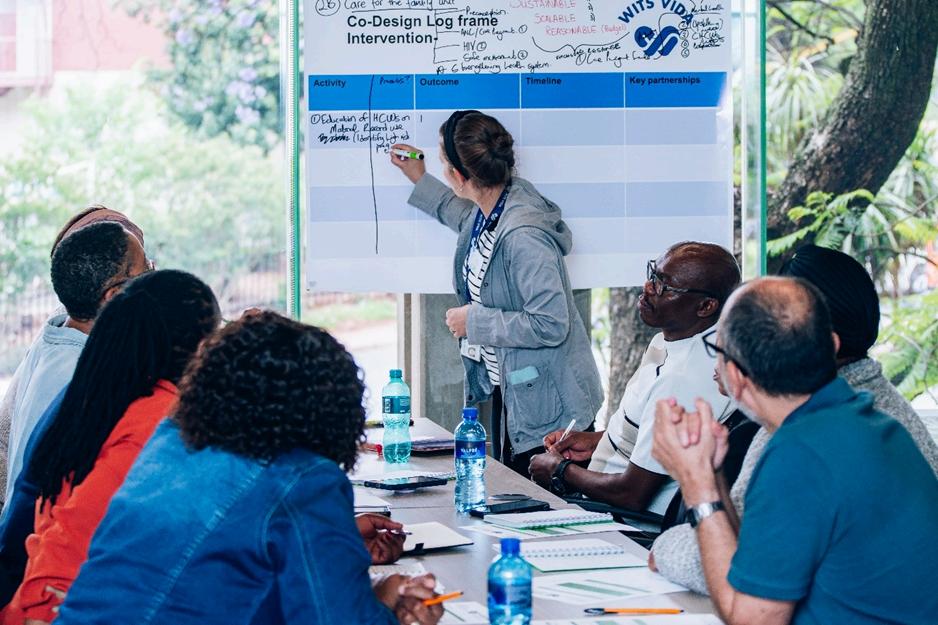
The Child Health and Mortality Prevention Surveillance (CHAMPS) hosted various stakeholders for its codesign workshop to reflect on the impact, communications, and engagement strategy (ICE). CHAMP - a pioneering global health initiative aimed at reducing child mortality in regions with the world’s highest rates of preventable deaths operates in twenty catchment areas in nine countries across Africa and Southeast Asia.
The workshop was geared towards leveraging the groups’ experience and expertise Together, the group of representatives from NGOs, mothers, community councillors, and government departments such as COGTA (Department of Cooperative Governance and Traditional Affairs) and the Department of Health (DoH) and the ICE team designed CHAMPS’ ICE strategy
Over 60 members of this collaboration mapped out the key focus areas that will be implemented over the next five years, ensuring that the organisation remains responsive to the needs of Soweto, the community it served by this initiative.
The top priority focus areas identified by the collaborative are the Effective use of the Road-ToHealth Booklet, Growing Healthy Families and Care for premature baby
The workshop served as a vital platform for dialogue and collaboration, fostering an inclusive environment where all voices can be heard. Participants engaged in meaningful discussions to identify critical issues and develop strategic priorities to guide CHAMPS’ initiatives.
“This workshop is an incredible opportunity to harness the collective insights of our community of stakeholders,” said Prof. Ziyaad Dangor, Research Director at Wits University’s Vaccines and Infectious Diseases Analytics (WITS VIDA) research unit “The reason we’ve asked everyone here is to guide us, guide us in the next phase of CHAMPS What are we going to do to continue to make a difference?”
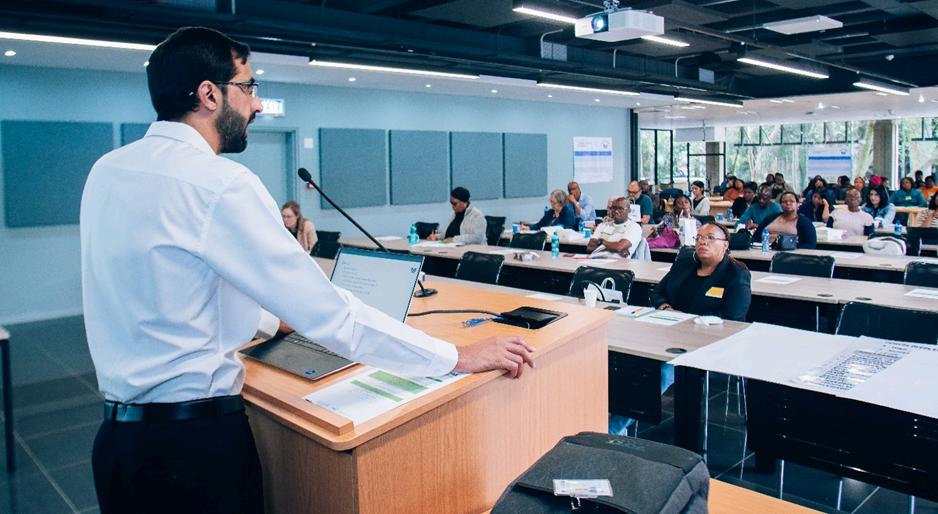
Professor Dangor speaking at the co-design workshop
Participants engaged in interactive sessions designed to facilitate open communication and idea sharing Key topics included care packages for families (including pregnant women and care for premature babies) and tools for caregivers *Read more
Fewer than 0.5% of participants in human genome research today are people with African ancestry, but continental African populations will comprise over 26% of the global total by 2050
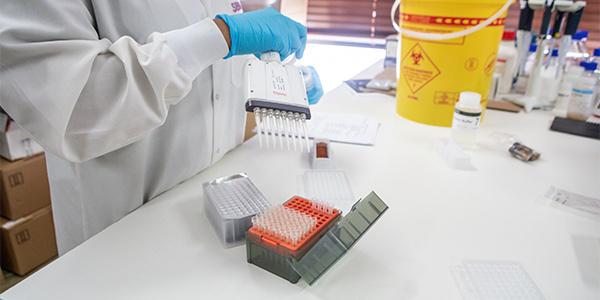
Based at the Sydney Brenner Institute for Molecular Bioscience, the Chair will lead academically rigorous research in precision medicine and genomics in Africa
The Roche Research Chair for Precision Medicine and Genomics will facilitate research and capacity strengthening in precision media and genomics
This new Chair is established with support from Roche’s African Genomics Program and this position is a critical step towards strengthening precision medicine research, innovation and capacity in Africa
Find further application and post details here. The application deadline is 15 January 2025.
Why we need to study African precision medicine and genomics Africa is still underrepresented in genomic studies, often resulting in ineffective medical treatment for its diverse populations
Harnessing Africa's unparalleled genetic diversity could offer insights into physiological adaptation, disease mechanisms, and new drug targets.
Professor Michèle Ramsay, SBIMB Director, says, “Increased research capacity in African genomics will expand genetic, biological and phenotype variation data. This allows for more individualised diagnosis and treatment The incumbent of the research chair will play a crucial role in building the next generation of genomic scientists to serve the wider field of precision medicine "
Genetic profiles are well-researched in the Global North but cannot be applied to all healthcare contexts Greater research capacity in precision medicine will allow medical treatment to go beyond a “one-size-fitsall” approach
Precision medicine seeks to tailor healthcare to individual characteristics, accounting for how diseases such as diabetes, cardiovascular disease, cancers, mental health disorders, musculoskeletal disorders, and infectious diseases play out.
The Roche Research Chair for Precision Medicine and Genomics in Africa receives an annual research grant over five years, with a package that includes support to build a robust research programme at the University. *Read more








